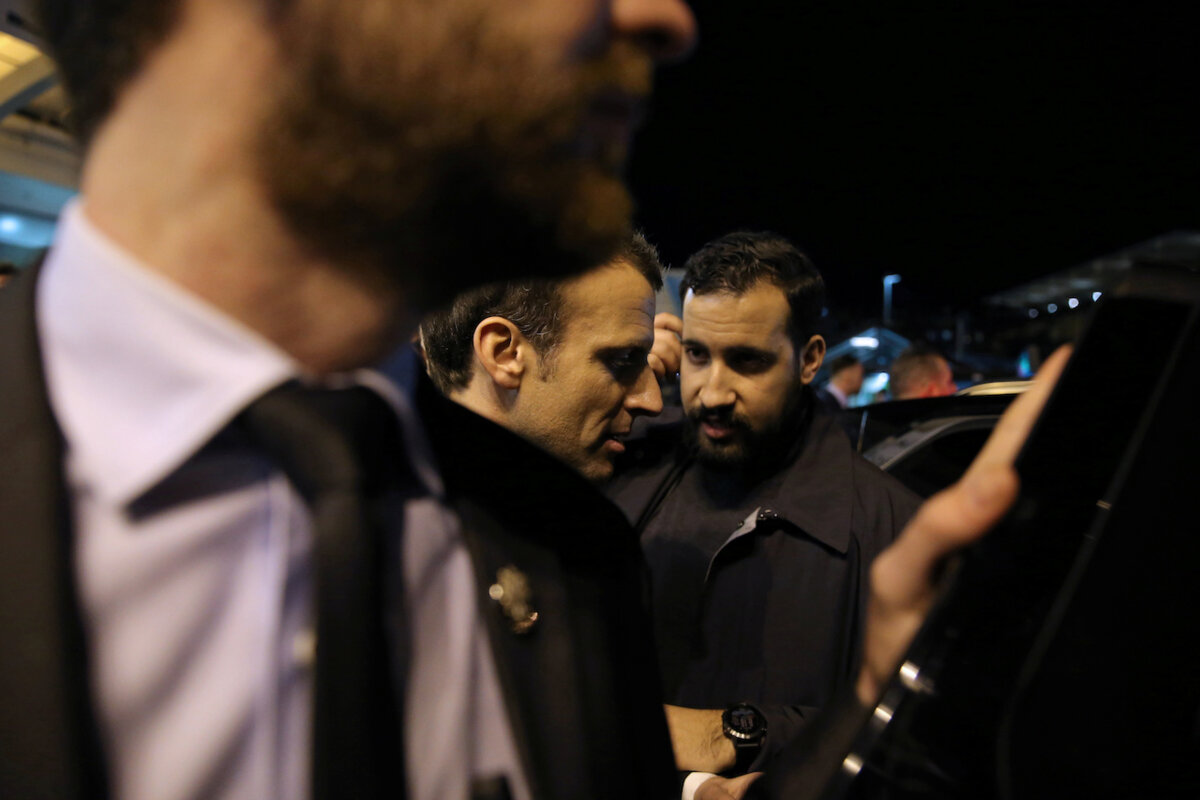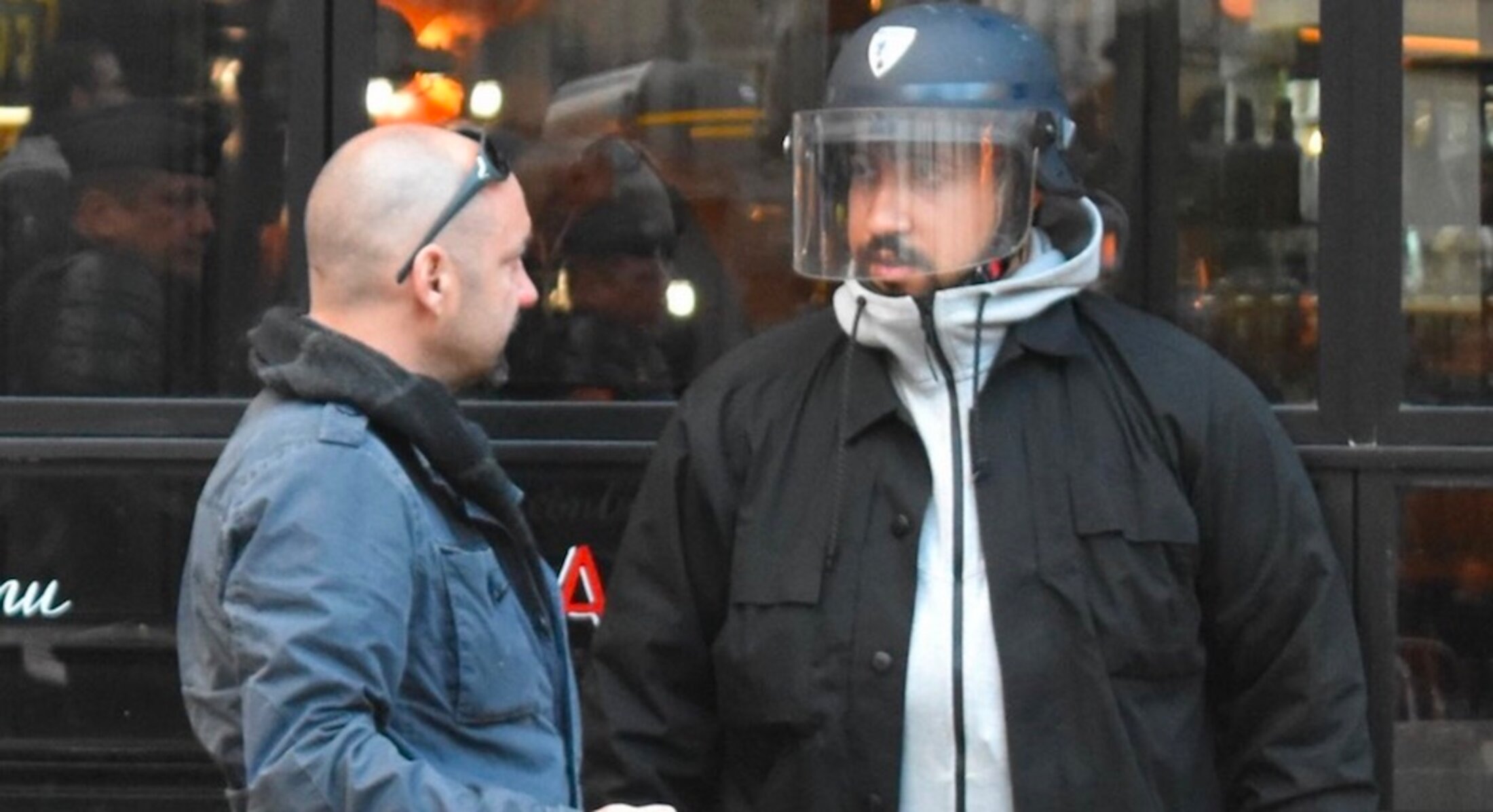French public prosecution service officials, accompanied by police officers, arrived unannounced at Mediapart's editorial offices in Paris on Monday morning with the intention of carrying out a search of the premises as part of investigations which notably cited supposed evidence of a breach of the personal privacy of President Emmanuel Macron's disgraced former security aide Alexandre Benalla.
The alleged breach of privacy was in relation to extracts published by Mediapart last week of a compromising conversation between Benalla and Vincent Crase, a gendarmerie reservist and former security manager for President Macron’s ruling LREM party. At the time of their meeting, both Benalla and Crase, who lost their jobs last summer after evidence, notably video footage, emerged of them assaulting people on the margins of May Day demonstrations in Paris while wearing police insignia, were ordered by a judge investigating the May 1st events not to enter into contact with each other.
The extracts of their conversation published by Mediapart last week, raised serious questions about the activities of the two men, before they were dismissed, in a security contract with a Russian oligarch. They also showed Benalla claiming to have the continued support of President Macron, despite being placed, along with Crase, under formal investigation for their recorded violent acts on May 1st.
Two prosecutors from the Paris prosecutors' office accompanied by three police officers – one a divisional superintendent – arrived at Mediapart’s offices at 11.10am on Monday to carry out the search, just as members of the Mediapart editorial team held their regular morning news conference.
Mediapart refused to allow the search on the grounds of its right, under French press freedom laws, to protect the identity of its sources.

Enlargement : Illustration 1

Deputy public prosecutor Yves Badorc, who was present during the attempted raid on Monday morning, informed Mediapart that he, his colleague and the three police officers wanted to search the offices as part of a fresh development in the Benalla case. He said that after Mediapart's revelations last week of the taped conversation between Benalla and his friend Crase, a preliminary investigation had been launched not into the substance of the issues raised by those revelations but in relation to – among other alleged offences – a breach of Benalla's and Crase's privacy.
Mediapart’s report, which was the result of several months of investigations based on several independent sources and previously unknown documents, shed new light on the background to the Benalla affair, which has evolved into an affair of state.
The investigation by the prosecution authorities targets the means by which the recordings, which are highly compromising for Macron's former security aide, and which by ricochet raise questions about his relationship with the president himself, were made. The prosecutor suggested the broadcast of the recordings were a violation of the right to privacy of Benalla and Crase and of the potentially unlawful possession of interception devices.
Mediapart's revelations demonstrated that Benalla and Crase had, by meeting secretly in Paris in the early afternoon of July 26th 2019, breached the terms of a judicial control order – in effect conditional bail – placed on them by the investigation into their acts on May 1st 2018.
The Mediapart investigation also proved Alexandre Benalla's personal involvement in a security contract with a Russian oligarch who is close to Russian President Vladimir Putin, while Benalla was still working at the presidential office, the Élysée Palace, where he had the official title of deputy to the president’s cabinet chief. The oligarch in question, Iskander Makhmudov, is also suspected by several European judges of links with one of the most notorious criminal gangs in Moscow.
It also emerged from Mediapart’s enquiries that Benalla and Crase had tried to hide the evidence of the Russian contract.
Meanwhile, the revelations last week of their conversation have not been contested by either Benalla or Crase.
Later on Monday, the prosecutor’s office confirmed that neither Benalla nor Crase had lodged a complaint for violation of personal privacy, but said it had received “elements that justified the opening of a preliminary investigation into the breaching of the intimacy of personal privacy and the illicit possession of equipment or technical devices of a nature to allow the interception of telecommunications or conversations”.
It was the first time that Mediapart has been the subject of an attempt by judicial officials to carry out a search of its premises.
Mediapart’s refusal to allow the search, which would have involved the potential seizing of editorial documents and equipment, is allowed by law. In the case of a preliminary investigation by prosecution services, they are required to first obtain the agreement of the person or persons targeted by the search before it can be carried out. However, the prosecution services have the option of applying to a magistrate – a judge specifically assigned to ruling on issues of “freedom and detention” – for a warrant for the search which, if delivered, would make it incumbent on Mediapart to allow access to its editorial offices.
Deputy prosecutor Yves Badorc on Monday morning said that such a warrant may subsequently be requested.

Enlargement : Illustration 2

The public prosecution services, unlike an independent judge in charge of a judicial investigation (an examining magistrate), are hierarchically subservient to the government. The move by the Paris public prosecutor to raid the offices of a media organisation in relation to the accomplishment of its mission – to publish verified information of public interest – is astonishing on several counts, and not only that of its avowed purpose of defending the interests of Alexandre Benalla and Vincent Crase.
Firstly, the timing of the move; Mediapart was contacted on February 1st by police officers acting on the orders of an examining magistrate investigating the evidence of Benalla and Crase assaulting individuals during Mayday demonstrations in Paris on May 1st last year. The police officers requested a copy of the sound recording extracts revealed last week by Mediapart. Mediapart, as made clear by Fabrice Arfi, a member of its investigations team, this Monday morning at 9am, agreed to the request – which was made to establish, in the official investigation, the violation by Benalla and Crase of their conditional bail, which prevented them from communicating with each other. Such a violation could potentially result in their placement in preventive detention.
Yet the same day, on Monday, the probe opened in haste by the Paris public prosecution services in defence of Benalla’s “personal privacy”, resulted in the attempt to raid Mediapart’s offices.
Secondly, the swift action of the prosecution services contrasts singularly with the delay they took in separate, preliminary investigations (prior to the appointment of an examining magistrate) into the May Day assaults involving Benalla and Crase. At the time, last July, the prosecutor’s office waited 48 hours before carrying out a search of Benalla’s home, citing the lack of a key to enter the premises. In the intervening period, a safe box belonging to Benalla had been removed from the apartment, apparently along with its contents.
Mediapart refuses to be intimidated, neither by the protagonists in the case, nor by the public prosecution services, and will continue in its rightful role of investigating and revealing matters of public interest.
- Below: following the attempted raid on its offices on Monday morning, Mediapart held a press conference, streamed live via Facebook, presented by its publishing editor Edwy Plenel, journalists Fabrice Arfi, Marine Turchi and Antton Rouget, who led the investigation published last week, and Mediapart lawyer Emmanuel Tordjman. Also present was Christophe Deloire from Reporters sans frontières, an NGO dedicated to defending the freedom of the press. Click screen to play (in French only).


